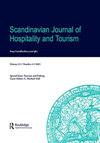Educating sustainability through hackathons in the hospitality industry: a case study of Scandic hotels
IF 3.1
4区 管理学
Q2 HOSPITALITY, LEISURE, SPORT & TOURISM
Scandinavian Journal of Hospitality and Tourism
Pub Date : 2021-01-28
DOI:10.1080/15022250.2021.1879669
引用次数: 8
Abstract
ABSTRACT Education for sustainability (EfS) in the hospitality sector is increasingly recognised as one of the driving forces for sustainable development. One way of fostering sustainability in the hospitality industry is through sustainability hackathons, which are intensive events focusing on “hacking” new sustainability ideas. This paper critically explores how the hospitality industry designs and executes sustainability hackathons within the context of EfS. An exploratory case study was conducted on the Scandic Hotels chain. Data utilised including both relevant reports and in-depth interviews with the highest level of management of Scandic. The execution of the sustainability hackathon illuminates how value-based education, creative problem-solving and co-opetition were critical aspects to foster EfS in the hospitality industry. Moreover, the hackathon facilitators, i.e. the hotels’ General Managers, were found to play an essential part in shaping the sustainability education and the event’s potential impacts. This paper contributes to expand knowledge on EfS offered by the hospitality industry (as opposed to EfS in formal educational institutions) and make practical recommendations on how sustainability hackathons could be better facilitated by hotel chains.通过酒店业的黑客马拉松教育可持续发展:斯堪的纳维亚酒店的案例研究
酒店业的可持续发展教育(EfS)越来越被认为是可持续发展的驱动力之一。促进酒店业可持续发展的一种方法是通过可持续发展黑客马拉松,这是一种密集的活动,专注于“黑客”新的可持续发展理念。本文批判性地探讨了酒店业如何在EfS的背景下设计和执行可持续发展黑客马拉松。对Scandic连锁酒店进行了探索性案例研究。所使用的数据包括相关报告和对Scandic最高管理层的深入采访。可持续发展黑客马拉松的举办说明了基于价值的教育、创造性解决问题和合作是在酒店业培养EfS的关键方面。此外,黑客马拉松主持人,即酒店总经理,被发现在塑造可持续发展教育和活动的潜在影响方面发挥着重要作用。本文有助于扩大对酒店业提供的EfS的了解(而不是正规教育机构提供的Ef S),并就连锁酒店如何更好地促进可持续性黑客马拉松提出切实可行的建议。
本文章由计算机程序翻译,如有差异,请以英文原文为准。
求助全文
约1分钟内获得全文
求助全文
来源期刊
CiteScore
7.90
自引率
8.30%
发文量
14
期刊介绍:
Scandinavian Journal of Hospitality and Tourism is the leading Nordic journal for hospitality and tourism research. SJHT aims at initiating and stimulating high-impact and innovative research relevant for academics and practitioners within the hospitality and tourism industries. The journal takes an interdisciplinary approach including, but not limited to geography, psychology, sociology, history, anthropology, and economics. SJHT encourages research based on a variety of methods, including both qualitative and quantitative approaches. The journal covers all types of articles relevant to the Nordic region, as well as the North Atlantic, North Sea and Baltic regions. We also welcome reviews and conceptual articles with a broader geographical scope that clearly enhance the theoretical development of the hospitality and tourism field. In addition to research articles, we welcome research notes and book reviews. Published articles are the result of anonymous reviews by at least two referees chosen by the editors for their specialist knowledge.

 求助内容:
求助内容: 应助结果提醒方式:
应助结果提醒方式:


